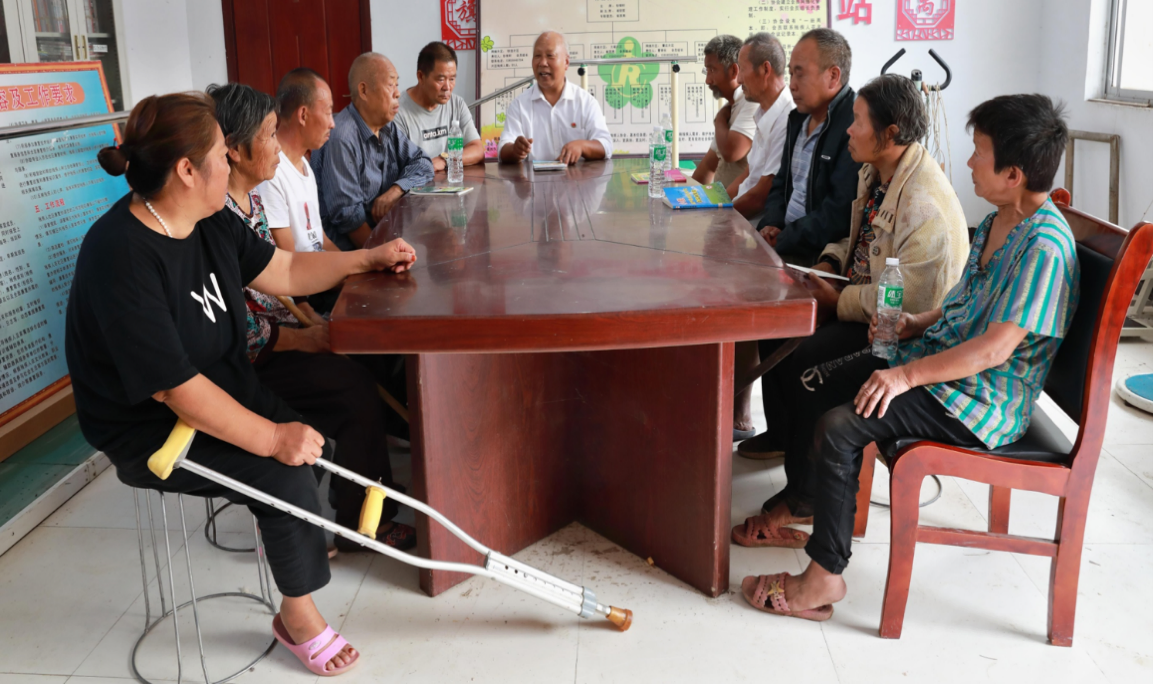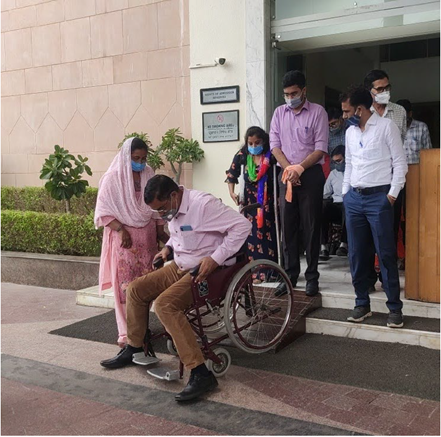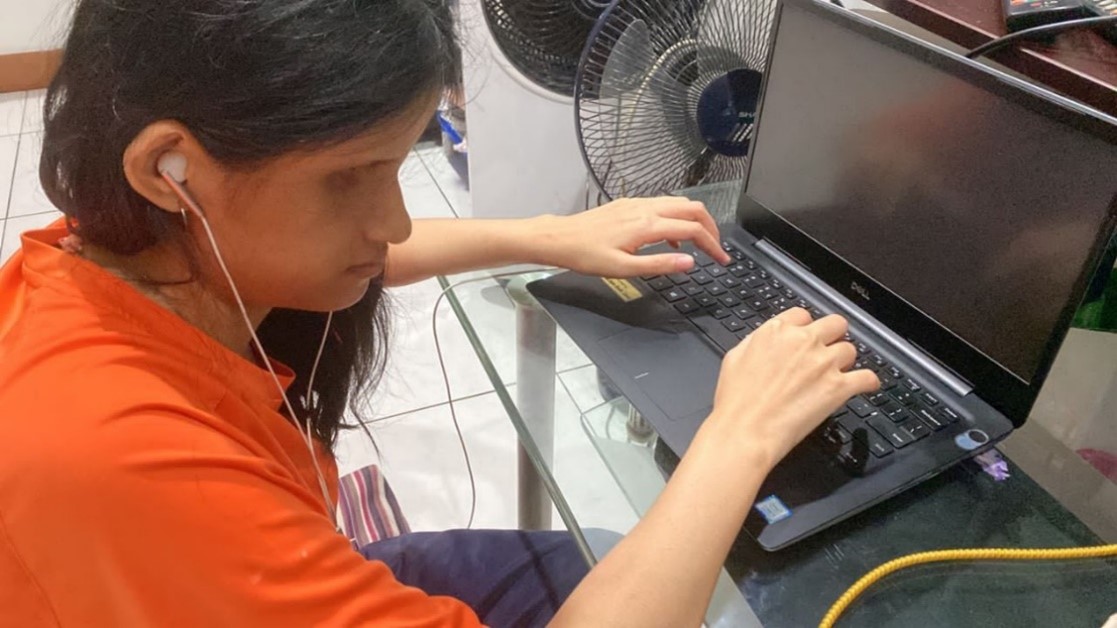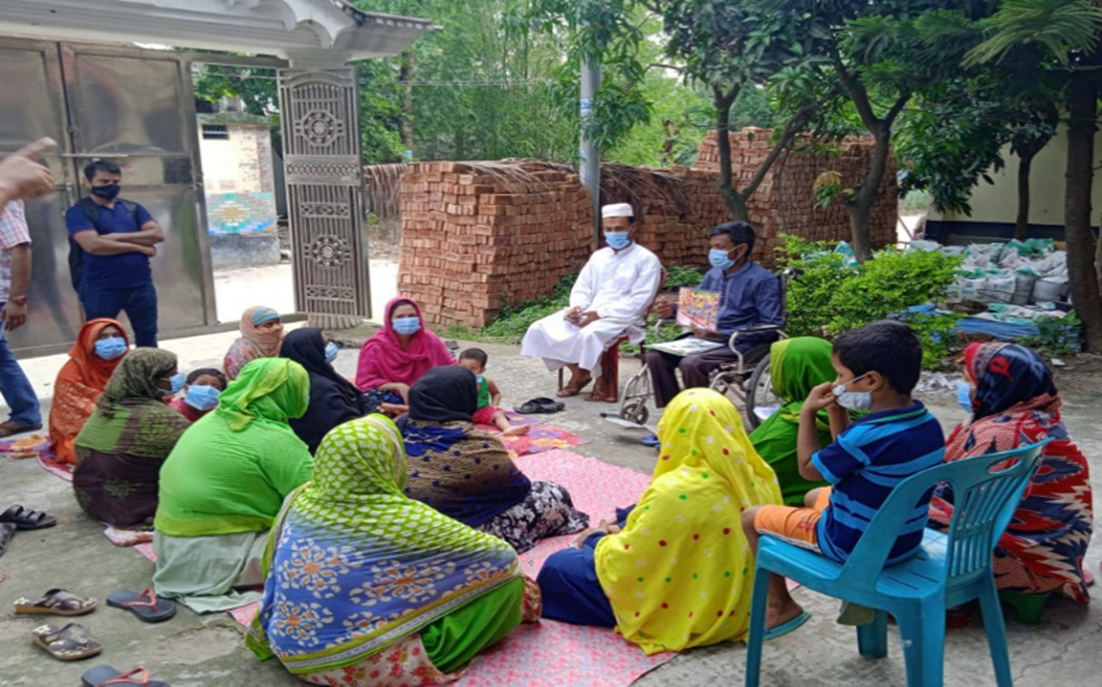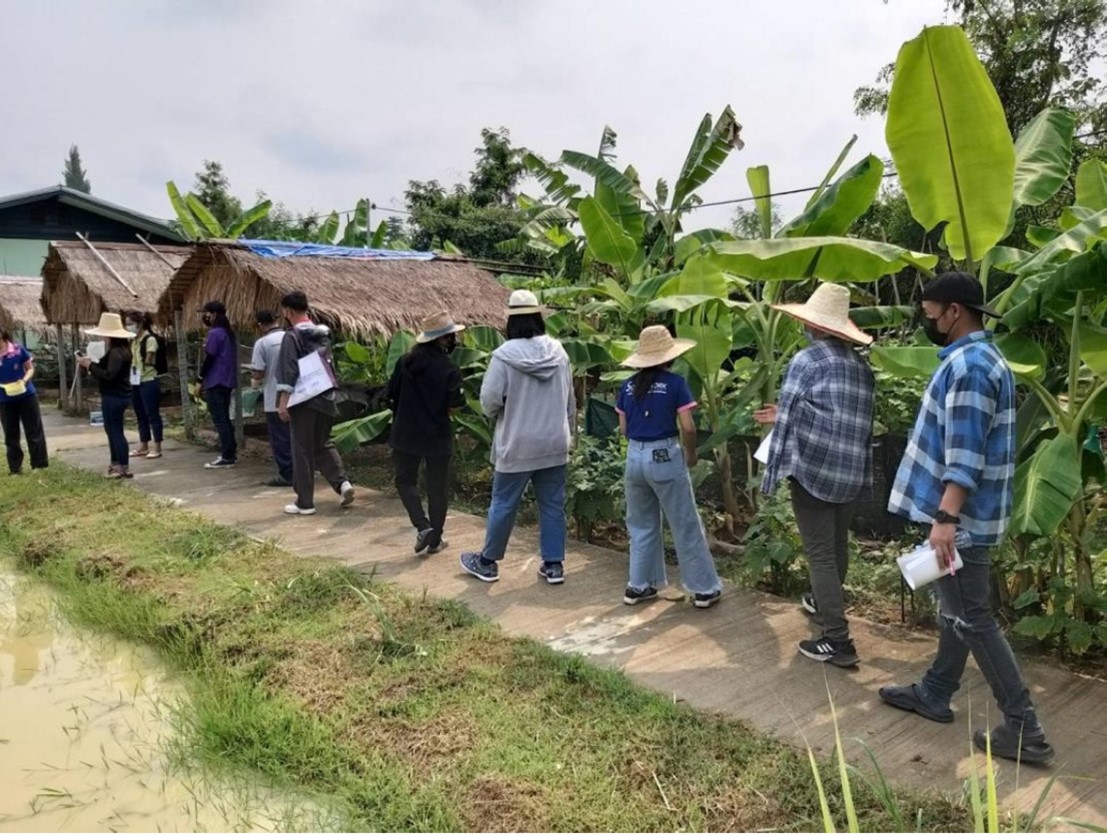 Protecting and Empowering Persons with Disabilities in the Context of the COVID-19 Pandemic
Capacitating persons with disabilities during the pandemic and beyond
Protecting and Empowering Persons with Disabilities in the Context of the COVID-19 Pandemic
Capacitating persons with disabilities during the pandemic and beyond

Challenges
The Asia-Pacific region is home to an estimated 690 million persons with disabilities, many of whom encounter barriers to full and effective participation in society. The COVID-19 pandemic has exacerbated existing inequalities and hindered progress towards achieving disability-inclusive development and Sustainable Development Goals (SDGs). Persons with disabilities are at great risk of being left behind in the COVID-19 response and recovery. In addition, the COVID-19 crisis has put the resources of governments and civil society organizations (CSOs) under strain. Many organizations, including organizations of persons with disabilities (OPDs), may lack the institutional and financial capacities to fully address the diverse needs of persons with disabilities during the pandemic and beyond. In this context, it is critical to mainstream disability rights and inclusion into both short- and long-term COVID-19 responses, so as to ensure persons with disabilities have continued and improved access to essential information, support and services.
Towards a Solution
With financial support from Rehabilitation International, ESCAP is implementing a project on supporting and empowering persons with disabilities in the context of the COVID-19 pandemic. ESCAP has fostered close partnerships with OPDs and CSOs to advance disability-inclusive development during the pandemic and beyond thereby substantially contributing to the fulfilment of SDG 10 on reducing inequalities and of SDG 17 on partnerships.
The project consists of two components:
- A dedicated web page on COVID-19 and disability inclusion has been developed by ESCAP to enable persons with disabilities, policymakers and other stakeholders to access timely information and resources on the pandemic. The web page includes: (1) a database on disability-inclusive government responses to the pandemic by ESCAP members and associate members in the Asia-Pacific region; and (2) a database comprising more than 240 disability-related resources developed by governments, CSOs and United Nations entities, including those in accessible formats.
- Seed-funding and technical assistance for pilot initiatives have been provided by ESCAP to five OPDs and CSOs, including the Asia-Pacific Development Center on Disability (APCD) in Thailand, the Centre for Disability in Development (CDD) in Bangladesh, the National Council for the Blind, Malaysia (NCBM), Samarthyam in India and Zhumadian Disabled Persons’ Federation (ZDPF) in China.
ESCAP has supported partner institutions in incorporating both disability and gender perspectives into the design and implementation of the pilot initiatives. Its partners have delivered essential support and services – such as community-based mental health services, vocational skills training and referrals to social protection programmes – to persons with disabilities to mitigate the adverse impacts of the pandemic. These pilot initiatives serve demonstrative purposes as case studies and prototypes for potential adaptation, replication and scale-up by other CSOs and local governments. Good practices and lessons learned could also inform policymaking in future pandemic crisis responses.
The following tangible results were achieved through the implementation of pilot initiatives:
- APCD has enhanced the capacity of persons with intellectual disabilities to lead healthy, food-secure and independent lives during and after the pandemic in Thailand. Monthly online meetings were organized to promote peer learning and exchange and training workshops.
- CDD has advanced inclusive community-based mental health services for persons with disabilities in Bangladesh. Twenty peer-responders, including 14 persons with disabilities, were recruited and trained to provide mental health support to 772 persons with disabilities through door-to-door visits, group sessions and teleservices. Training in inclusive community-based mental health programming and technical support visits were conducted for six OPDs from different locations in Bangladesh. Moreover, an exposure visit to project locations by government representatives and a national-level dialogue were organized to facilitate the integration of disability perspectives into the Action Plan of the National Mental Health Strategy 2020-2030.
- NCBM has promoted disability-inclusive digitalization in national legislation and enhanced the capacity of persons with disabilities to advocate for digital rights in Malaysia. More than 20 persons, including those with diverse disabilities, were trained in web accessibility auditing, accessible publishing, gender-disability intersectionalities and strategic advocacy. In addition to conducting a survey to assess the situation of persons with disabilities, particularly women and girls with disabilities, during the pandemic NCBM delivered technical support to the Intellectual Property Corporation of Malaysia and issued press statements urging the government to accede to the Marrakesh Treaty.[1] Notably, Malaysia passed the Copyright (Amendment) Act 2021 in December 2021 and acceded to the Marrakesh Treaty in March 2022.
- Samarthyam has strengthened the capacities of OPDs, community networks and government agencies to integrate disability rights and inclusion into institutional and community structures and mechanisms in the state of Rajasthan, India. Training in disability-related legislation, policies, campaigns and programmes was delivered to 27 OPD members and 18 government officials. District-level accessibility audit teams were formed to undertake audits of 35 key government buildings. The initiative also increased the participation of women with disabilities in OPDs and community networks, with 26 OPD representatives and 19 self-help group members trained in gender equality and women’s empowerment. Furthermore, six district-level monitoring committees were established to address disability issues.
- ZDPF has improved the livelihoods and well-being of persons with disabilities in Zhumadian City, China, thereby enhancing their resilience to contingencies and crises. A mechanism was developed to monitor and track the socio-economic status of persons with disabilities in four project locations. Persons at risk of falling back into poverty were referred to relevant government entities for further support services. ZDPF provided training in vocational skills to more than 300 persons with disabilities, covering the areas of agricultural technologies and techniques, animal breeding, straw painting and crocheting, among others. Twelve self-help and mutual support groups were established to catalyse the sustained employment of persons with disabilities.
To promote the sharing of innovative approaches and broaden South-South cooperation, ESCAP has invited the above-mentioned project partners to share their experiences in empowering persons with disabilities in the context of the pandemic at regional events, such as the Regional Forum on Advancing Disability-inclusive Development on 3 December 2021.
In line with the spirit of “nothing about us without us”, the partnerships with OPDs and CSOs have maximized the participation of persons with disabilities in project design and implementation, ensuring the relevance of activities to the needs on the ground. The project has enhanced linkages of community-level initiatives with policymaking and programming at the subnational and national levels, creating a long-term impact on disability-inclusive development beyond the COVID-19 pandemic.
[1] The Marrakesh Treaty to Facilitate Access to Published Works for Persons Who Are Blind, Visually Impaired or Otherwise Print Disabled, administered by the World Intellectual Property Organization.
Contact Information
Countries involved
Supported by
Implementing Entities
Project Status
Project Period
URL of the practice
Primary SDG
Primary SDG Targets
Secondary SDGs
Secondary SDG Targets
Similar Solutions
| NAME OF SOLUTION | Countries | SDG | Project Status | |
|---|---|---|---|---|
360-Degree Awareness Tool to Fight COVID-19 Raising awareness and ensuring public wellbeing through a one-stop platform for fighting COVID-19 in Bangladesh |
Bangladesh, China, India, Malaysia, Thailand | 16 - Peace and Justice Strong Institutions | Ongoing | View Details |
A Billion Brains: Smarter Children, Healthier Economies High Level Meeting on South-South Cooperation for Child Rights |
Bangladesh, China, India, Malaysia, Thailand | 17 - Partnerships for the Goals | Completed | View Details |
A-Card Initiative |
Bangladesh, China, India, Malaysia, Thailand | 10 - Reduced Inequalities | Completed | View Details |
Accelerating Digital Transformation in All Ministries in Bangladesh Promoting the rapid design and implementation of plans to digitize all ministries and subordinate government institutions in Bangladesh |
Bangladesh, China, India, Malaysia, Thailand | 10 - Reduced Inequalities | Ongoing | View Details |
Accelerating the Transformational Shift to a Low-Carbon Economy in Mauritius Towards supplying 35 percent of the country’s energy needs with renewables by 2025 |
Bangladesh, China, India, Malaysia, Thailand | 05 - Gender Equality 09 - Industry, Innovation and Infrastructure 13 - Climate Action | Ongoing | View Details |
